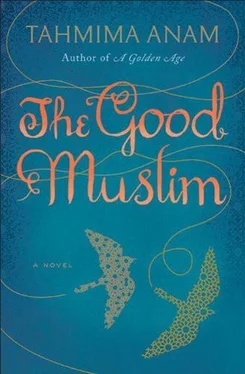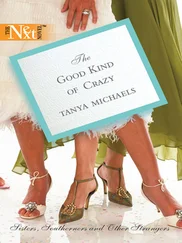‘It’s just a place,’ she said, ‘just an open field. They could have done anything with it, they could have left it there.’ She was imagining it now, the playground, a place that in the daytime would be littered with the newspaper cones of roasted peanuts, and tiny grains of puffed rice with mustard oil clinging to them, and the ribbons that fell from the braids of little girls as they ran from the bumper cars to the Ferris Wheel and screeched to their parents to hold their hands and the unwound shoelaces and the scraps of Mimi chocolate and pink glucose biscuit wrappers. A playground. Paltan Maidan, the most sacred site of the whole country, the place where Mujib had made all his speeches, and where the Pakistan Army had surrendered, and where he had returned after his nine months in exile and inaugurated the country, wiping tears from his eyes with a handkerchief, which he then waved at the crowd, thousands and thousands of them, as if to say, I come in peace, I am your father.
It was where, for a moment, they had won. Now their history would be papered over by peanuts and the smell of candy floss.
Joy stopped the car again, on a side road. He unbuckled his seatbelt and turned to her. A few feet away was a roadside biri stall. The man behind the stall was asleep, his ankles crossed, his arm flung over his eyes. She started to cry again. Everyone else was passing by this park every day; they were buying tickets and going inside and having a good time. No one else was angry.
Joy peeled her fingers from her face. ‘Hey,’ he said, ‘it’s okay. The first time I saw it, I cried too.’ He leaned close. He smelled of lemons. She felt the lifting of her senses. She wrapped her hand around the back of his neck and pulled him towards her. Lips yielding. He was saying something but she couldn’t hear him. She pulled him closer — now her mouth was scraping his cheek. Smooth, with a hint of bristle. Rough-smooth. Lemonaftershave. She exhaled. She could hear him now, his lips at her ear.
‘Let me tell you something about love,’ he said. ‘They chopped off my finger with a cleaver, did you know that? I don’t know where they got it, a heavy big knife like that. Probably got it off some butcher. But you know what I was thinking when they did it? I was thinking that of all the people I knew, you would be the only one who wouldn’t mind. And when I got home and found my mother in a white sari, I knew you would understand that too, because you had a dead father all those years. I have loved you this whole time,’ he said. ‘All this time.’ He pulled away, serious now, his hands cupped over her shoulders.
‘Promise me’ Maya whispered.
‘Anything.’
‘That you won’t ask me to forget. Who we are.’
‘I promise.’
He made a fist around her hands. Thank you. He put it to his forehead. Thank you.
*
Maya felt someone shaking her roughly. ‘Apa, apa.’ A woman stood at the foot of the bed, waving her gloved arms around like a mime artist.
‘Who are you?’
‘I’m Rokeya’s sister. Forgive me for waking you like this, but she asked me to fetch you. She’s having terrible pain.’
‘Go on, I’ll meet you upstairs.’
‘Not upstairs. She’s at home with us. Hurry, rickshaw is waiting.’
Maya pulled on a crumpled salwaar-kameez, slipped her feet into a pair of chappals and ran through the back door, brushing past Sufia, who had taken to sleeping beside the stove as the nights grew colder.
In the rickshaw, she inspected Rokeya’s sister. ‘Have I seen you before? You didn’t join the upstairs jamaat?’ They set off towards the north side of the city, the rickshaw-wallah cycling swiftly through the empty streets, a biri at the edge of his lips.
‘I came once, but I didn’t want to stay. Khadija was angry because Rokeya didn’t bring in the rest of our family.’
The girl was covered from head to toe, with only a small piece of chiffon, like a dirty pane of glass, through which to see the world. The girl lifted the chiffon and revealed her face. In the darkness it shone, pale and perfect. ‘Khadija, whatever she calls herself — she’s a heartless woman.’
‘Don’t you like her sermons?’ She thought of the rapturous faces of the other girls, the way they fanned the air around Khadija with their gaping, devoted breaths.
‘She believes every word she says. That’s something. But I can’t follow someone like a mule.’
‘Then why are you dressed like that?’
‘Do you think I could have come to fetch you in the middle of the night otherwise?’
Maya considered this for a moment. A girl like this one, she might never have ventured out if it weren’t for the cover of her cloak. The practical reply impressed her. She squeezed the girl’s hand. ‘How long ago did the labour start?’
‘A few hours. She refused to go to the hospital. She was half starved when she came back to us; we thought she wasn’t going to make it.’
‘What happened?’
‘She won’t say. She was punished, I think, for something.’
Maya remembered seeing Rokeya twice, out in the sun, kneeling. Why hadn’t she said something? She had imagined Rokeya was doing it of her own free will and just shelved it among the other bizarre rituals of the upstairs. Now she felt guilty. ‘I’m sorry, I had no idea.’
‘Stop here,’ the girl said to the rickshaw-wallah. ‘We’ll have to walk the rest of the way.’ She had brought a torch, and they picked their way through the narrowing road, finally coming upon a small house with a curtain draped across the doorway. There was a front room and a back room and, somewhere beyond, a kitchen that was probably shared with the neighbours.
Rokeya’s father caught a glimpse of Maya and politely averted his eyes. ‘Subhan Allah,’ he said, his voice thick, ‘please, she’s waiting.’
Rokeya was swallowing her breaths. When she saw Maya, she squeezed her eyes shut and said, ‘I knew you would come.’
Maya washed her hands in a bowl of water and palpated Rokeya’s stomach. Then she told the girl to breathe while she performed an exam. Rokeya winced as Maya plunged her arm deep into her and measured her cervix. ‘Just relax now,’ she said, falling quickly into the soothing tones she reserved for women in labour. She probed with light fingers, reaching for the soft dome of the baby’s head. Instead, she felt the baby’s buttocks. Breech. They should have taken her to the hospital, but it was too late now, she was already too advanced. Maya had delivered breech babies before, but they were risky, the delivery slow. And where was Rokeya’s husband? There was no sign of him. Better not to ask, not now. ‘Listen to me, Rokeya. Open your eyes.’
Rokeya’s eyelids fluttered open.
‘Your baby is upside-down. Do you hear me? Nod if you understand. It’s too late to do anything, you’ll have to deliver. Don’t worry, I’ve seen it before. It’s going to be slow and it’s going to hurt. Understand?’ The baby’s backside was going to come out first, then the legs. She wouldn’t be able to assist; if she laid her hands on the baby, it might extend its arms and get stuck in the birth canal.
Rokeya nodded, squeezing her eyes shut again.
When the time came, Maya pulled her into a squatting position. ‘Next pain comes, you push, okay? Push as hard as you can.’
With each contraction, Rokeya put her head down and grunted. Soft, softer than Maya had ever heard a woman grunt. Maya whispered a stream of encouraging words, but the girl didn’t appear to be listening, just breathing roughly out of her nose and clenching her hands together into hard white fists.
Her sister came and went, boiling water for Rokeya, cradling her head. The contractions were coming faster now, but without any assistance the baby could descend only a few millimetres at a time. An hour passed. Another. Rokeya collapsed on to her back. ‘I can’t,’ she said, ‘I can’t any more.’
Читать дальше












